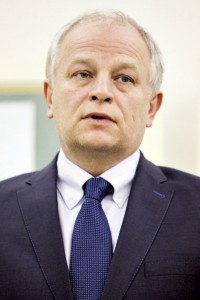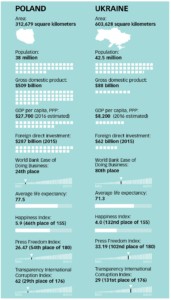Ukraine’s KredoBank nearly died of insider lending in 2009.
The financial crisis had imperiled the lender, exposing that as much as 71 percent of the bank’s loans were nonperforming, according to a 2012 Financial Times report. The institution’s Polish parent — PKO Bank Polski — gave the struggling bank at least $250 million between 2008 and 2010, slapping on new lending protocols and extra oversight.
But that near-death experience gave the bank the wherewithal it needed to survive the country’s 2014–2015 banking collapse, which has seen more than 90 banks yanked off the market amid widespread insider lending.
So how did the bank survive?
One of the reasons is not running the bank in the same reckless way that now-First Vice Prime Minister Stepan Kubiv, who oversees the Economy Ministry, did.

First Ukrainian Vice Prime Minister Stepan Kubiv (Nosach Vitaliy)
Credit apocalypse
KredoBank was founded in 1990 in Lviv as JSC Kredyt Bank.
Kubiv became chairman of the bank in 2000. His tenure saw PKO Bank Polski acquire a majority stake in 2004. The European Bank of Reconstruction and Development took 28 percent of Kredobank’s shares as part of the same deal.
Grzegorz Szatkowski, Kredobank’s current CEO, joined the lender in 2012 after spending a year at the bank’s Polish parent and after many years in Eastern European investment banking.
Szatkowski said that he joined the bank “specifically for the role of coordinating the restructuring of Kredobank.”
The bank was restructured, and new controls allowed the Polish-owned institution to weather Ukraine’s 2014 financial collapse and widespread banking failure intact.
“We did some purposeful projects to increase the liquidity prior to the crisis,” Szatkowski said. “So that liquidity was really crucial to succeed through the crisis.
Kubiv was fired in 2008. An Economy Ministry spokeswoman did not reply to multiple requests for comment regarding his tenure at the bank.
“It’s easy to judge that the results of the bank after the crisis of 2009 were very bad, and they impacted the bank’s performance for four years,” Szatkowski said. “That speaks for itself.”
When Kubiv was named National Bank of Ukraine chief in February 2014, Polish journalist Jacek Leski called the appointment “bad news,” saying that PKO Bank Polski injected 1 billion Zloty ($257 million) to save the bank after Kubiv left.
All in all, PKO Bank Polski gave Kredobank a $150 million capital injection and $90 million in credit, along with another $20 million loan to stabilize the bank.
Before becoming head of the National Bank of Ukraine in 2014, Kubiv ran KredoBank from 2000–2008. He was given a seat on the board of Bank Lviv in 2010.
Trepidation
Since 2009, KredoBank has recovered. Szatkowski says that the bank anticipates 30 percent growth this year.
“We see more investment financing demand from companies for the first time for the last three years,” he said.
But he added that the institution’s Polish managers are hesitant to put their foot on the gas pedal for further growth.
“We don’t expect an increase in our capital from the side of our shareholder,” he said, referring to PKO Bank Polski.
Szatkowski added that while the bank had looked at buying up the loan portfolios and former assets of collapsed banks, it had so far declined to do so.

In every key ranking, Ukraine comes up short compared to its western neighbor and good friend Poland. The two nations had roughly similar economies, but Poland reduced corruption, shed its communist past and curbed oligarchs while joining the European Union and NATO.
Sources: Kyiv Post research.
Szatkowski said that the bank had focused on keeping its loan portfolio focused on smaller- to medium-sized businesses in recent years.
“As a consequence of the previous crisis, we understood that we cannot do everything,” he said. “We have to find a segment that we feel comfortable in, and that segment was mid-market and to some extent small and medium enterprises.”
He added: “From the previous crisis we understood that a collateralized consumer looks very good…and that’s why we decided in 2012 to make it our main, intermediate focus.”
And while Ukraine’s economy is growing, obstacles remain to lowering interest rates. Growth in deposits is slow compared to demand for loans, while the NBU remains hesitant to further lower the rates.
“Form matters much more than it should, compared to substance, in a lot of aspects,” he said. “That must change.”
